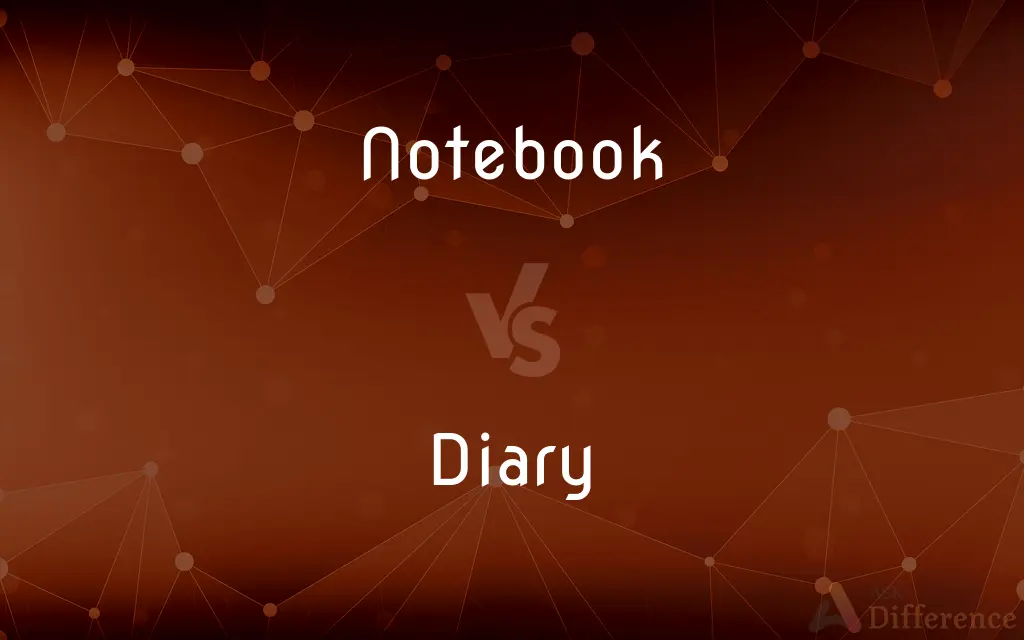Notebook vs. Diary — What's the Difference?
By Tayyaba Rehman & Urooj Arif — Updated on March 7, 2024
A notebook is for jotting down information, while a diary is for recording personal experiences and thoughts.

Difference Between Notebook and Diary
Table of Contents
ADVERTISEMENT
Key Differences
Notebooks are versatile tools used for various purposes, such as taking notes in meetings or lectures, drafting ideas, or organizing tasks. They come in many forms, sizes, and styles, catering to different needs, from academic to professional settings. Diaries, on the other hand, serve as personal journals where individuals document their daily experiences, emotions, and reflections, often used as a means of self-expression and introspection.
While notebooks are generally neutral and can be used by anyone for any form of note-taking or record-keeping, diaries are more intimate, often kept private by the user. The content of a diary is usually more personal and detailed regarding the writer's feelings, experiences, and thoughts about their daily life, making it a personal record or memoir.
The structure of a notebook is typically simple, with pages that may be blank, lined, or grid-patterned, providing a blank canvas for the user's content. Diaries often include features like dates and sometimes prompts to guide personal reflection, although many modern diaries also come with blank or lined pages for open-ended entries.
Notebooks can be used for a wide range of tasks, including but not limited to, academic note-taking, project planning, sketching, and list-making. Diaries, while primarily used for personal journaling, can also serve specific purposes such as tracking health and wellness, exploring creative writing, or setting personal goals.
In practice, the distinction between a notebook and a diary can sometimes blur, especially when a notebook is used exclusively for personal reflections or a diary is used for note-taking. However, the intent and content typically define their primary use: notebooks for information and tasks, diaries for personal experiences and thoughts.
ADVERTISEMENT
Comparison Chart
Primary Use
Note-taking, information recording
Recording personal experiences and thoughts
Content
Neutral, varied
Personal, intimate
Structure
Blank, lined, or grid pages
Dated entries, sometimes with prompts
Privacy
Often public or shared
Generally private
Additional Uses
Sketching, planning, lists
Wellness tracking, creative writing, goal setting
Compare with Definitions
Notebook
A versatile stationery item used in various settings.
The project manager used a notebook for meeting minutes and action items.
Diary
A personal journal for documenting daily experiences and emotions.
She wrote in her diary every night to reflect on the day's events.
Notebook
A tool for organizing information in written form.
The student's notebook was filled with lecture notes and summaries.
Diary
A book with dated entries for introspection and memory keeping.
His diary served as a detailed account of his travels abroad.
Notebook
A book of blank or lined pages for writing notes.
She carried a notebook to jot down ideas for her novel.
Diary
A private space for self-expression and creativity.
The artist used her diary to sketch and write poetry.
Notebook
A portable means of recording data and observations.
The scientist kept a field notebook to document experimental results.
Diary
A tool for exploring thoughts and feelings in writing.
Keeping a diary helped her navigate her thoughts during challenging times.
Notebook
An essential academic and professional accessory.
At the conference, attendees were provided notebooks for workshop activities.
Diary
A medium for setting and reviewing personal goals.
In his diary, he tracked his progress toward fitness and career objectives.
Notebook
A book of blank pages for notes.
Diary
A diary is a record (originally in handwritten format) with discrete entries arranged by date reporting on what has happened over the course of a day or other period. A personal diary may include a person's experiences, thoughts, and/or feelings, excluding comments on current events outside the writer's direct experience.
Notebook
A light, portable computer that is generally thinner than a laptop.
Diary
A book in which one keeps a daily record of events and experiences.
Notebook
A book in which notes or memoranda are written.
Diary
A usually daily written record of personal experiences and observations; a journal.
Notebook
A kind of user interface in literate programming, allowing calculations to be interspersed with human-readable comments, diagrams, etc.
Diary
A book or computer file used for keeping such a record.
Notebook
Ellipsis of notebook computer
Diary
A daily log of experiences, especially those of the writer.
They kept separate diaries. His was on paper and her diary was on her computer's hard drive.
Notebook
A book in which notes or memorandums are written.
Diary
A personal organizer or appointment diary.
Notebook
A book in which notes of hand are registered.
Diary
(obsolete) Lasting for one day.
Notebook
A book with blank pages for recording notes or memoranda
Diary
(intransitive) To keep a diary or journal.
Notebook
A small compact portable computer
Diary
A register of daily events or transactions; a daily record; a journal; a blank book dated for the record of daily memoranda; as, a diary of the weather; a physician's diary.
Diary
Lasting for one day; as, a diary fever.
Diary
A daily written record of (usually personal) experiences and observations
Diary
A personal journal (as a physical object)
Common Curiosities
Can a notebook be used as a diary?
Yes, a notebook can be used as a diary if it's dedicated to personal reflections and daily experiences.
Are all diaries dated?
While many diaries come with dates, some are undated, offering flexibility in how and when entries are made.
How do digital notebooks and diaries compare to their physical counterparts?
Digital notebooks and diaries offer additional features like encryption and multimedia integration but may lack the tactile experience of writing by hand.
What are some popular features in modern diaries?
Modern diaries often include prompts, inspirational quotes, and spaces for goal setting and tracking.
What makes a diary private?
A diary is considered private due to its personal content, often detailing the writer's inner thoughts and feelings.
How does the choice of notebook or diary affect productivity?
The choice can impact productivity by providing structured (diary) or flexible (notebook) spaces that match the user's needs for organization or self-expression.
Can a diary have multiple uses?
Yes, apart from personal journaling, diaries can be used for specific purposes like health tracking, creative writing, or planning.
Is it common to keep both a notebook and a diary?
Many people use both, keeping a notebook for general note-taking and a diary for personal reflections.
Can writing in a diary improve mental health?
Yes, journaling in a diary can serve as a therapeutic practice, helping individuals process emotions and experiences, leading to improved mental health.
How do cultural perceptions of notebooks and diaries vary?
Cultural perceptions can influence the design, use, and significance of notebooks and diaries, reflecting different attitudes towards privacy, education, and self-expression.
Share Your Discovery

Previous Comparison
Fit vs. Outfit
Next Comparison
Beaver vs. CapybaraAuthor Spotlight
Written by
Tayyaba RehmanTayyaba Rehman is a distinguished writer, currently serving as a primary contributor to askdifference.com. As a researcher in semantics and etymology, Tayyaba's passion for the complexity of languages and their distinctions has found a perfect home on the platform. Tayyaba delves into the intricacies of language, distinguishing between commonly confused words and phrases, thereby providing clarity for readers worldwide.
Co-written by
Urooj ArifUrooj is a skilled content writer at Ask Difference, known for her exceptional ability to simplify complex topics into engaging and informative content. With a passion for research and a flair for clear, concise writing, she consistently delivers articles that resonate with our diverse audience.














































